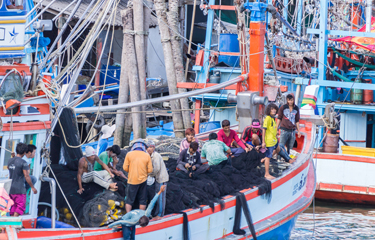Baseline international standards for human rights, labor conditions, and social responsibility in the seafood industry will have to wait.
Countries pushed back against draft guidance on social responsibility in fish value chains developed by the United Nations’ Food and Agriculture Organization (FAO) when it was first officially presented in November in Vigo, Spain. As a result, FAO is spending the next year-plus creating a scoping paper that will more explicitly spell out what should be included in the guidance.
Meanwhile, labor abuses continue to be uncovered aboard fishing vessels and many workers around the world face abysmal conditions – a problem compounded by the health and economic disruptions caused by the COVID-19 pandemic.
"It's also about reputation management for the entire sector," FAO Fisheries and Aquaculture Deputy Director Audun Lem told SeafoodSource. "A lot of the conditions we've seen are totally unacceptable. ... It's not something that you can say it's only far away, it's only in certain countries in the developing world. It's also closer to home than you may think."
The guidance was meant to provide a human rights standard for the 50 million seafood workers around the globe by articulating core principles related to the inherent dignity of all individuals, elimination of forced labor, fair treatment for all, gender equity, child labor, and rights of migrant workers. Six appendices were planned to address specific subsectors of the seafood industry — aquaculture, industrial fishing, small-scale fishing, processing, distribution, and retail.
Countries approved the idea of voluntary guidance in 2017 at a meeting of the FAO Committee on Fisheries (COFI) Sub-Committee on Fish Trade. In 2018, countries gave FAO an official mandate to create the guidance, and the organization embarked on a wide-ranging stakeholder consultation process, both online and in person at regional conferences around the world. FAO worked closely with industry, associations, unions, and other stakeholders.
"There was not a single one that said this is not necessary. There was not a single one that said this is not important," Lem said. "We had hundreds and hundreds of input that informed the draft."
Then, in November 2019, the process derailed.
"Whereas the subcommittee in the past agreed to the relevance and importance of the issue, there was some specific feedback to us for further work to make even more clear that these are voluntary guidelines, that the countries didn't want to see anything non-voluntary," Lem said. "They didn't want to see specific requirements coming out of this."
In 2018, national fishing organizations supported the idea of developing guidance to help businesses frame their thinking on social responsibility, as long as the guidance remained voluntary, according to National Fisheries Institute President John Connelly. But when the draft guidance was presented last year in Vigo, fishing organizations felt it was overly prescriptive.
"We were a bit surprised that the language had turned from voluntary to a lot of, in shorthand, ‘must, shall, will be obligated to, required,’" Connelly told SeafoodSource. "It just concerns governments enough that they balked at moving it forward in its current form ... They expected it to be voluntary guidelines to these countries."
However, the draft guidance explicitly states in the first sentence of the section describing the nature and scope of the work, “This Guidance is voluntary in nature.” Later, it says, “Nothing in this Guidance prejudices the rights, jurisdiction, and duties of States under international law.”
Connelly said a targeted approach would be the best way to ensure countries and companies around the world treat workers fairly.
"We can spend a lot time checking on good actors, whereas we're not spending enough time helping those countries or companies that need to improve," Connelly said. "We think the best application of resources globally is to find where the hotspots are and either help governments create better systems of enforcement or then at the company level help companies understand that markets are only going to accept their product if they treat their workers with respect."
FAO developed similar guidance in partnership with the Organization for Economic Cooperation and Development in 2016 to address social responsibility in land-based agriculture. Countries are now questioning why another guidance document for seafood is needed, especially since the International Labor Organization's C188 Work in Fishing Convention addresses conditions aboard fishing vessels. Only 18 countries have ratified that convention, however.
"There was some hesitancy by many member countries to add another set of guidelines," Lem said. "There was a sentiment that it wasn't entirely clear why we were doing it, despite the mandate we had received earlier."
FAO’s scoping paper – which will be presented at the next COFI Sub-Committee on Fish Trade meeting in 2021 – will state the objectives of the guidance, and what should and should not be included. Whether member countries who felt dissatisfied with the guidance in 2019 will approve of the process in 2021 remains to be seen.
"Maybe with hindsight, we should have spent more time working with the countries to underline how important this was. We already had a mandate so we didn't think that would be necessary,” Lem said. “Sentiments and priorities change so whereas there was strong momentum a few years ago, maybe at the end of last year it was different."
Photo courtesy of Bumbim Pensinee/Shutterstock







